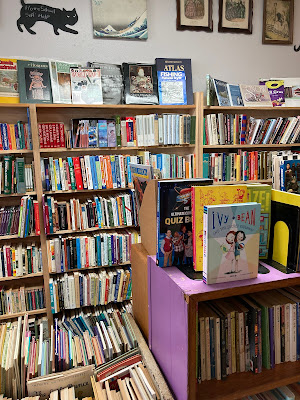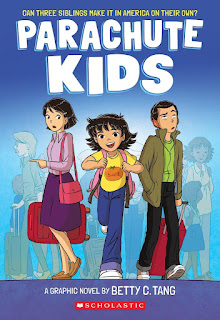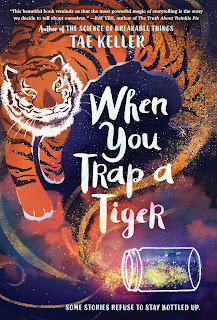#IMWAYR: Everything I Learned About Racism I Learned in School!
Hi everyone! Sorry for not posting last week—I was away on a lovely week-long vacation to the beach, which was really emotionally healing. I feel like in getting to enjoy myself and avoid all the usual pressures of life, I got to feel more confident as a human being and get in touch with some of my deeper thoughts—so now I'm feeling more like myself upon my return.
Unlike my big trip last year (see here and here), I did far less reading. Instead, I:
- Visited an art museum
- Rode on a boat
- Went to the mall
- Swam in the ocean
- Sat in a hot tub
- Hung out with my family
- Virtually talked with my friends
- Took around 250 photos (not including the art at the museum)
Everything I Learned About Racism I Learned in School
For full clarity, in this review, all quotes from the book are in italics.
A few months back, when I attended the North Texas Teen Book Festival, I was lucky to hear from author Tiffany Jewell at a panel, and then stop by her table in the signing line (and get my copy of this book signed!). I hadn't heard of this book until that day, but I knew I wanted to read more books about racism, and this seemed like an excellent place to start. And y'all, it was—this book is phenomenal.
Everything I Learned About Racism I Learned in School is divided into a variety of different chapters, most written by Jewell herself. Jewell's chapters are part memoir or personal narrative, as she chronicles her experiences in school from elementary school up through college, and how racism affected those experiences in countless ways. And Jewell's chapters are part primer on antiracism, as she shares statistics, research, and ideas by other scholars so that readers of all ages can better understand systemic racism and discrimination.
Then, interspersed with Jewell's chapters, we get one or two chapters apiece from 19 contributors, sharing their own personal experiences with schooling and racism. These chapters ensure that so many different human experiences, not just Jewell's own, are represented in the book. We hear from beloved children's authors (Torrey Maldonado, Joanna Ho, Minh Lê, Randy Ribay, and more), scholars and academics, and teenagers affected by racism in schools today.
The book moves fast, coming in at just 224 pages with large text, and the accessible writing style of Jewell and her contributors ensures that anyone can benefit from this book. I can imagine kids as young as middle school seeing their own experiences reflected here, and learning about things that need to change in this world. And then on the other end, I think this is an essential read for educators, who need to understand exactly how racism is perpetuated in schools, in part due to adults' behavior, and in part due to poorly designed systems and practices that still haven't changed.
I want to highlight a few chapters of Jewell's that are simply amazing, and left me with so much to think about:
- "What I Learned About Tracking" – I'm starting to feel like intelligence is a made-up idea. I think all of us are capable of thinking deeply and understanding deeply, so who cares how fast we do it, or how much random crap is stored in our brain? And this chapter really emphasized this idea for me. Jewell walks us through the school days of three students who have been placed on different tracks in school. Supposedly, these tracks enable individualized learning, but really, it seems like they set the "gifted" students on a path to success, and leave the rest struggling and marked as "less than." And the administrators choose which students are most likely to benefit from the higher-level tracks—it is likely that students are assigned to tracks (and potential futures) on the basis of on implicit bias and stereotypes. I'm wondering what could happen if we saw every student as gifted, if we saw every student as deserving of high-quality education that could help them reach their fullest potential.
- "What I Learned During My Sophomore Year" – Jewell writes about having spent time in high school in a club that fundraised for international causes (e.g., hospitals, sanitation). She writes, "I felt like our club was making a difference. (And maybe we were.) I didn't recognize that my own community could have used that funding to ease the costs of school lunches, school supplies, and winter gear." And then she writes, "We never went deeper or tried to understand the decades and centuries of institutional misuse and abuse of power that led to kids needing to hawk notecards at craft fairs to raise money for necessities of life." Let that sink in for a sec.
- "What I Learned About Suicide" – I appreciated this chapter for drawing connections between racism, schools, and the alarming numbers of youth suicide and suicidal ideation in our world today. By pulling in the context of mental health, this chapter makes clear that we as a society are not effectively taking care of our young people.
- "What I Learned About Military Recruitment" – Writing about how the military recruited her and other students of color while they were just in high school, while their White classmates were largely left alone, Jewell writes, "I learned that the military and the government and the education system—which (I thought) was supposed to be watching out for my best interests—colluded in hopes of getting kids like me (poor and Black/Brown and academically motivated) to head out into the world and defend the United States even though the country was rarely willing to defend me and people like me."
- "What I Learned About Malcolm X and Thelma & Louise" – Jewell writes about a truly appalling (and absurd) situation in which, at the end of a college class, the professor let students vote to watch the movie Thelma & Louise instead of reading The Autobiography of Malcolm X. As Jewell puts it, "...my professor allowed a movie about two fictitious White women to be a substitute for a book about a very real Black man and his experiences in our country."
- "The Culture of White Domination in Schools" – This is my favorite chapter in the whole book, because here, Jewell shows us how the design of American schooling—which we often take for granted—inherently creates power imbalances and supports racism. And in showing us this fact, Jewell asks us to imagine a system of schooling centered around students' needs rather than old habits and adults' wishes. She asks us to imagine a system of schooling where grades do not dictate self-worth, adults do not direct students using power and fear, natural human emotions are allowed in the classroom, and all stories are valued even if they are not written down in an old novel or a textbook. It's a radical and necessary vision, and this is the chapter I especially hope every educator seeing this will read.
- Discussing their relationship as a kid with performing music, especially jazz, shea wesley martin writes, "But my love of music, of being heard in my rawest form, pushed me all of the way to graduation." This struck me—I think being heard in our rawest form is maybe every human's deepest want, myself included.
- Ozy Aloziem writes, "I am more than the ways in which I have or will continue to suffer. How I show up during the mess is my testimony. I can feel the ways in which I heal around the hurt and the softness that emerges as a result of that. I choose to lean into that softness, into that grace."
- Ozy Aloziem (again!) writes, "...I'm learning to be relentless. I'm trying to go back to feeling things with every atom in my body, loving so deeply it hurts. I'm tired of looking at the totality of my life, I want to get stuck in the details of it all again. So here's to that."
- Y'all, I'm sad Ozy Aloziem is not an author, because I would read everything she writes.
- Writing to her younger self, Gayatri Sethi writes, "You will grow up to be a hypereducated person with multiple degrees from world-renowned institutions. You will be viewed as the quintessential girl child from the Global South whom the world declared needed schooling for saving. It will be a widely held belief rooted in saviorism that your life chances and success depend largely on you being schooled. You will believe them. You will be enamored of all the alluring promises of futures possible for you through schooling."
This book is freaking amazing. My only concern with the whole book is with the chapter, "What I Learned About Students' Rights." In this chapter, Tiffany Jewell establishes rights for young people that—I agree—every young person deserves. But I'm not sure every young person is actually receiving them, and I worry her framing of them as rights implies that schools will always provide them. For example, Jewell writes, "You have the right to privacy and no one (including school and district administrators, faculty, and staff) should 'out' you to your family, classmates, anyone. ... You have the right to keep your transgender status private. Your school cannot disclose this information without your consent. You are protected by the federal privacy law." Per this article, schools do out LGBTQ+ youth to their parents without the consent of those youth, and I worry the phrasing in this chapter implies students are safe when they may not be.
That concern aside, I cannot recommend Everything I Learned About Racism I Learned in School enough. I think every human being can relate to school being a source of trauma, at least to some degree, and Jewell and her contributors challenge notions of what a school should be, envisioning a place where true learning, critical thinking, and safety can happen. This book provides catharsis for the past experiences of so many human beings, and it provides a roadmap of questions and answers for our future as a society. We would do well to listen.









I'm glad you had such a relaxing, fun vacation. This sounds like a powerful book every school should own. Thanks for sharing it with us this week.
ReplyDeleteThis book really sounds like an important read for all educators. The problem here in Canada is that so many people think that BIPOC here don't experience the same issues as happen in America. They are wrong of course. I like to think that reading this book would at least get them thinking.
ReplyDeleteBlack Cat Books sounds like a delightful book store!
I'm looking forward to the meeting on Wednesday!
Obviously I can't resist Black Cat Bookstore. I can't imagine why I would ever be in Corpus Christi, but if I am, you know where my first stop will be! Your vacation sounds wonderful--a nice balance of new experiences and adventure plus seeing pretty things plus connecting with people who are important to you. I didn't realize Tiffany Jewell has a new book out. I agree with Cheriee: this sounds like one all educators must read. I'll certainly be adding it to my TBR. Thank you as always for the thoughtful review!
ReplyDeleteThis book sounds incredible - thank you for putting it on my radar!!
ReplyDeleteUgh. I am so far behind on my blog visits! I just saw an email from you about the August meet up so need to look at the date and get it on my calendar now.
ReplyDeleteYour trip to the beach sounds wonderful and relaxing. I am off to Montana in a couple weeks; I am more of a city person so we'll see how I do on a ranch!